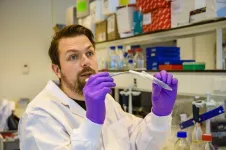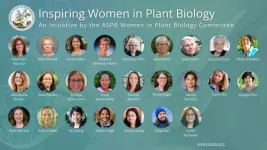(Press-News.org) The study, a collaboration between researchers at Imperial College London and GNS Science, suggests that reducing plastic pollution by 5% per year would stabilize the level of microplastics – plastics less than 5 mm in length – in the surface oceans.
However, the modelling shows that even reducing pollution by 20% per year would not significantly reduce existing microplastics levels, meaning they will persist in our oceans beyond 2100.
Microplastics have been found to be circulating in all of the Earth’s oceans and some of the greatest concentrations of them are thousands of miles from land. These tiny particles of plastics can be hazardous to marine life and they find their way back from our oceans into human food systems.
The United Nations Environmental Assembly (UNEA) are aiming to adopt a legally binding resolution to completely eradicate the production of plastic pollution from 2040, including ocean microplastics.
The researchers developed a model to predict the impact on ocean microplastics of eight different scenarios of plastic pollution reduction over the next century, starting from 2026 up to 2100.
The results, published in Environmental Research Letters, show that if countries reduce plastic pollution by more than 5% each year, the amount of microplastics in the ocean could stabilise, rather than continue to increase.
First author Zhenna Azimrayat Andrews, who completed the work for her MSc in Environmental Technology at the Centre for Environmental Policy, Imperial College London, said: “Plastic is now everywhere in the environment, and the ocean is no exception. Whilst our results show that microplastics will be around in the oceans past the end of the century, stabilising their levels is the first step towards elimination.”
Removing microplastics from the ocean’s surface
Microplastics pose the greatest threat when they accumulate in the surface ocean, where they are consumed by ocean life, including fish that we may eat. One way microplastics can be removed from the surface ocean is by clumping together with tiny living organisms or waste material, like organic debris or animal droppings. These clumps can sink down into the deep ocean, taking the microplastics with them.
The team’s calculations, combined with real-world observations and testing of the model, suggest that these the buoyancy of the microplastics prevent these clumps from sinking, trapping them near the surface. Understanding how these clumps affect the levels of microplastics in the ocean is important for setting goals to reduce plastic pollution.
As marine life holds onto microplastics near the surface, even if the level of pollution produced every year is reduced, there would still be microplastics in the surface ocean for centuries. When they do sink, they will subsequently last in the deeper levels of the ocean for much longer, where their impacts are not well known.
Azimrayat Andrews said: “There can never be a completely successful removal of microplastics from all depths of the ocean, we kind of just need to live with it now. But the current global output of plastic pollution is so great, that even a 1% annual reduction in pollution would make a big difference overall.”
Setting ambitious and realistic goals
The researchers’ model is the first study that examines the efficacy of plausible treaty reduction targets. The large reductions required to reduce contamination indicate that a more coordinated international policy is necessary, rather than the UN’s proposed goal of 0% plastic pollution by 2040.
Azimrayat Andrews said: “If we want to move towards a lower plastic society, change needs to happen at a higher level. These changes should happen on an industrial level, as no single individual should have the weight of the world on their shoulders.
“Therefore, we need a more sustainable lifestyle integration, rather than people having to make individual choices, and so organisations like the NHS don’t have this pressure to become zero plastic in 10 years because the UN said so. National organisations will need to reduce their plastic use, but systemic change in industrial and commercial sectors could allow more grace for organisations like the NHS in the meantime.”
The researchers hope their analysis will help inform UN negotiations, which are planned throughout the year.
END
Ambitious targets are needed to end ocean plastic pollution by 2100
2024-05-24
ELSE PRESS RELEASES FROM THIS DATE:
Boost for research aiming to cure chronic diseases in an aging population
2024-05-24
The DRIVE-RM consortium, led by Professor of Experimental Nephrology Marianne Verhaar from UMC Utrecht, has been awarded €37.5 million under the prestigious NWO SUMMIT program. The SUMMIT grant recognizes world-class collaborations, while further strengthening these partnerships. The DRIVE-RM collaboration involves UMC Utrecht, Utrecht University, Eindhoven University of Technology, Maastricht University, and the Hubrecht Institute, focusing on smart materials that assist the body in healing.
Regenerative medicine involves repairing or replacing damaged tissues and organs by leveraging the body's own healing processes. DRIVE-RM ...
Quadruple therapies and the future of multiple myeloma treatment
2024-05-24
MIAMI, FLORIDA (MAY 23, 2024) – The treatment landscape for multiple myeloma, the second most common blood cancer, is shifting rapidly, with newly diagnosed patients increasingly being treated with a four-part drug combination that includes a new immunotherapy agent.
Over the last decade, options have evolved from double, to triple to quadruple combination therapies. What do these new options mean for patients, and how will treatment change in the future?
C. Ola Landgren, M.D., Ph.D., will ...
Announcement of winners for the third “Marie Sklodowska Curie Award”
2024-05-24
JST has selected winners for the third Marie Sklodowska Curie Award for young female researchers. For the third Marie Sklodowska Curie Award, we accepted applications from October 2 to December 11, 2023. Through document screenings and interviews with external experts, we have selected one Grand Prize winner and two Inspiration Prize winners. JEOL Ltd. will award 1M yen for the Grand Prize and 500K yen for each Inspiration Prize.
JST recognizes the importance of initiatives designed to promote the activities of female researchers in science, technology, and innovation, and based on this belief we established the “Marie ...
Baby bonuses and wedding bells: how life's big moments can challenge startups
2024-05-24
Life-changing events like the birth of a child, the purchase of a new home, or a lottery win could threaten the survival of a new business venture, research from Edith Cowan University (ECU) has found.
A recent study led by ECU’s Professor of Entrepreneurship and Innovation Pi-Shen Seet with Associate Professor Wee-Liang Tan from the Singapore Management University found that positive family events had a comparatively greater influence, albeit negatively, on the survival of a new venture, compared with negative events.
“A positive family event, like the birth of a child, often has an emotional spin-on effect for an entrepreneur ...
Wagner named 2024 recipient of the ASME George Westinghouse Gold Medal
2024-05-24
Robert Wagner, associate laboratory director for the Energy Science and Technology Directorate at the Department of Energy’s Oak Ridge National Laboratory, has been selected to receive the George Westinghouse Gold Medal from the American Society of Mechanical Engineers, or ASME. The award recognizes his work to advance state-of-the-art clean power generation systems through research on combustion, fuel technologies and controls.
Wagner will be presented the award in October during ASME’s ...
Sylvester research shows new treatment may enable more patients with high-risk blood cancers to receive stem cell transplants
2024-05-24
MIAMI, FLORIDA (MAY 23, 2024) – A new treatment approach using an older drug may enable more patients with high-risk blood cancers to receive transplanted stem cells from unrelated, partially matched donors, according to a study conducted by researchers at Sylvester Comprehensive Cancer Center at the University of Miami Miller School of Medicine and colleagues.
Results to be presented at the annual meetings of the American Society of Clinical Oncology (ASCO) and the European Hematology Association suggest the new approach may expand the donor pool, with patients from underrepresented racial and ethnic ...
Internationally trained female oncologists face many discrimination challenges in the U.S.
2024-05-24
MIAMI, FLORIDA (May 23, 2024) – Coral Olazagasti expected a relatively smooth transition when she moved to New York to start her residency after graduating from medical school in her native Puerto Rico. But that proved wishful thinking.
She not only experienced major culture shock, but also her superiors and colleagues often chastised her for speaking too loudly and joked about her accent.
“Puerto Rico is a U.S. territory so when I moved to New York, I thought it wasn’t going to be a big change,” said Olazagasti, ...
Fred Hutch at ASCO: Progress in treating metastatic cancer, hospice access for cancer patients, use of machine learning with CAR T-cell therapy
2024-05-24
The 2024 annual meeting of the American Society of Clinical Oncology (ASCO) will take place in Chicago and online May 31-June 4.
Below are highlights of Fred Hutch Cancer Center research to be presented at the conference and experts available to comment on news. You can follow Fred Hutch on social media for additional updates and check out Fred Hutch booth #14018 in the exhibit hall.
For interview requests with Fred Hutch experts, please contact media@fredhutch.org.
Prostate cancer
Prostate cancer is the most common cancer among men in the United States and, according to the National Cancer Institute, ...
How neurons build a 3-D vascular structure to keep the retina healthy
2024-05-24
Scientists have known for years that a lattice of blood vessels nourishes cells in the retina that allow us to see – but it’s been a mystery how the intricate structure is created.
Now, researchers at UC San Francisco have found a new type of neuron that guides its formation.
The discovery, described in the May 23, 2024, issue of Cell, could one day lead to new therapies for diseases that are related to impaired blood flow in the eyes and brain.
“This is the first time anyone has seen retinal neurons using direct contact with blood vessels as a way of guiding them to form these precise 3-D lattices,” said ...
Celebrating 25 Inspiring Women in Plant Biology
2024-05-24
The American Society of Plant Biologists (ASPB) Women in Plant Biology Committee recently named 25 Inspiring Women in Plant Biology to celebrate their achievements and inspire future generations of female plant biologists. This committee, dedicated to addressing particular concerns to women scientists and promoting the inclusion of female plant biologists throughout the Society and profession, created this list with input and nominations from the community.
“This initiative was inspired by two things: First, our desire to improve recognition of inspiring women scientists. We have had ...





